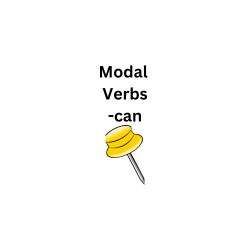Modal Verbs: can

Modal Verbs: can
Can is a modal verb that can be used to indicate ability, permission, or possibility.
Here’s how it can be used in different tenses and forms:
Present tense:
Affirmative: Subject + can + base form of the verb
(e.g., I can swim)
Negative: Subject + can’t (or cannot) + base form of the verb (e.g., I can’t swim)
Future tense:
Affirmative: Subject + will + be able to + base form of the verb
(e.g., I will be able to swim)
Negative: Subject + won’t (or will not) + be able to + base form of the verb
(e.g., I won’t be able to swim)
Indefinite infinitive passive:
Affirmative: can + be + past participle of the main verb
(e.g., The door can be opened)
Negative: can’t (or cannot) + be + past participle of the main verb
(e.g., The door can’t be opened)
Indefinite infinitive:
When can is used with the indefinite infinitive, it indicates that something is possible or permissible to do, without specifying exactly when or whether it will happen.
Here are some examples:
You can visit me anytime. (implies that the speaker is always willing to receive a visit, but does not specify when the visit will occur)
The store can be closed on weekends. (implies that the store is permitted to close on weekends, but does not specify whether it always does)
Perfect infinitive:
Affirmative: Subject + can + have + past participle of the main verb
(e.g., I can have finished my homework by 9 pm)
Negative: Subject + can’t (or cannot) + have + past participle of the main verb
(e.g., I can’t have finished my homework yet)
Perfect infinitive: When can is used with the perfect infinitive, it indicates the possibility that something has happened or will have happened by a certain time.
Here are some examples:
She can have finished the project by now. (implies that it’s possible for her to have completed the project by the present time)
I can’t have left my phone at home, I remember bringing it with me. (implies that it’s not possible for the speaker to have forgotten their phone at home, based on their memory of bringing it with them)
In both cases, can is used to express possibility or permission, but the indefinite infinitive is more general and non-specific, while the perfect infinitive is more specific and relates to a certain time or situation.
Can and to be able to:
The construction – to be able to is similar in meaning to can and can also be used to indicate ability, permission, or possibility.
However, to be able to is not a modal verb, and it can be used in all tenses and forms.
For example:
Present tense:
Subject + am/is/are + able to + base form of the verb
(e.g., I am able to swim)
Future tense:
Subject + will + be able to + base form of the verb
(e.g., I will be able to swim)
Indefinite infinitive passive:
be + able to + be + past participle of the main verb
(e.g., The door is able to be opened)
Perfect infinitive:
Subject + have + been able to + past participle of the main verb
(e.g., I have been able to finish my homework on time)
The main difference between can and to be able to is that can is a more informal and conversational way of expressing ability, while to be able to is more formal and can be used in a wider range of tenses and forms.
Click here Modal Verbs: can
Click here Modal Verbs: ought to
Click here Modal Verbs: need
Click here Modal Verbs: must
Click here Modal Verbs: to be
Click here Auxiliary Verbs: shall and will
Click here Auxiliary Verbs: to be
Click here Auxiliary Verbs
Click here Auxiliary and Modal verbs